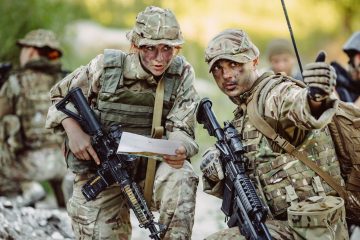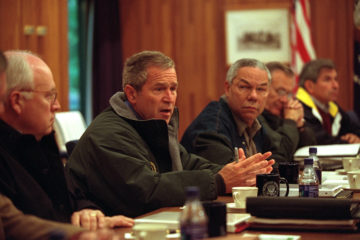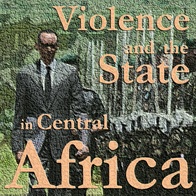
OxPol Blogcast. Women in Politics – In Conversation with Faye Curtis: Women in Ground Close Combat Roles, and Work Experience at NATO
OxPol Blogcast showcases research, analysis, insights, and experiences from the members of the University of Oxford’s Department of Politics and International Relations (DPIR), and specialist guests from the Oxford academic community and beyond. On this episode, OxPol Blogcast host Anastasia Bektimirova is joined by Faye Curtis, a DPhil International Relations researcher at the University of Oxford’s Department of Politics and International Relations (DPIR), to discuss the effects of integration of women into previously all-male military units. Faye guides us through the ongoing debates over the risks and opportunities of such policy change, and discusses the contribution of her research which addresses the lifting of the ban on women in ground close combat roles in the British Armed Forces. In the second half of the episode, we get a glimpse of another …

War and the Ballot Box: What the Iraq War Tells Us About Military Escalation in an Election Year
U.S. presidents have powerful political incentives to think twice before escalating a conflict in the lead-up to an election. Recent events in the Gulf suggest that President Trump is no exception when it comes to avoiding the commitment of “boots on the ground” in an election year. As both commander-in-chief and holder of the highest elected office, presidents must carefully weigh the political consequences of any decision regarding military strategy. Since voters tend to bear the brunt of the human and financial costs of war, decisions to send additional U.S. forces into combat are often fraught with risk of consequent reprisal at the ballot box. In my recent article in International Security, I explore how these electoral pressures affected decision-making during the Iraq War. …

Escape of the Gaak: New technologies and the ethics of war
In 2002, the Magna Science Centre in South Yorkshire witnessed a surprising event: a two foot tall robot, Gaak, escaped from a gladiatorial experiment with learning robots. The experiment, part of the “Living Robots” project, simulated a predator and pray scenario where some robots searched for food (prey) and others hunted for them (predators). Gaak, a predator, was left unattended for fifteen minutes and, in that time, managed to find and navigate along a barrier, find a gap, move through it and continue across a car park to the M1 motorway. Gaak was found rather quickly when a motorist almost collided with it. This story of robot liberation helps us to understand a simple fact about learning machines: they are unpredictable. …

Law, Legitimacy and Morality of Warfare: A Conversation about ‘Legitimate Targets?’
In the following conversation concerning her recent publication, Dr. Janina Dill, Departmental Lecturer in International Relations at the University of Oxford, navigates a clear-cut path through concepts of International Law (IL), legitimacy and morality in warfare. From a theoretical perspective, she explains the relationship between constructivism, IL and international relations and highlights how our understanding of this relationship may be better informed through new concepts such as ”behavioural relevance” and “normative success”. From a practical perspective, she examines the historical shift in the conduct of warfare and the use of drone warfare by the United States. In response to Brett Rosenberg’s questions, Dr. Dill contemplates whether there are in fact legitimate targets in war. Many have argued that International …

Why is important to understand the impact and responses required for sexual violence and torture survivors in conflict and post-conflict countries in Africa?
Since 1998 I have been carrying out applied research with colleagues and African organisations with survivors of sexual violence and torture. This research argues that sexual violence perpetrated in conflict and post-conflict settings causes devastating effects to individuals as well as whole communities. It results in extensive damage to survivors’ psychological, reproductive and gynaecological health. Ongoing research reveals that more women and girl-children survive conflicts than are killed; yet with tremendous wounds to their bodies and minds; assaults on their dignity, their feelings of self-worth and their future. In contrast, there are rarely consequences for the perpetrators. Applied research carried out in Uganda, Liberia and eastern Democratic Republic of Congo with colleagues and African organisations, argues that sexual violence is not solely a war crime and although extremely prevalent during conflicts, my research argues it has contaminated the post-conflict domestic sphere with high levels of community-perpetrated domestic violence and rape, particularly against young girls.
Survivors’ shame and stigma is exacerbated by severe social rejection, particularly for women and girls who become pregnant from rape, former abductees and those with AIDS and HIV infection. Many resultant physical and mental health problems are not treatable by the grossly over-stretched and under-resourced health care systems. Capacity building within primary health care and justice services needs to address psychological trauma, increase resilience and recovery through support groups, trauma counselling and improvement to mental health policies. It is vitally important that service providers (who have also often experienced human rights abuses) are assisted to develop peer support and supervision groups and receive culturally sensitive training in supporting traumatised survivors and their children born from rape. In conjunction with greater protection for their work, and regular salaries this would assist to prevent ‘burn out’.

How civil wars end
There is a tendency, even among scholars, to view civil wars as involving two actors—the “government” and “rebels.” This presumption likely arises because historical civil wars that have received the most attention—such as the American and Chinese civil wars—were generally fought between two recognized, organized combatants. Yet, many civil wars (both historical and modern) involve more than two actors.
Take the current civil war in Syria. The Syrian government battles a series of rebel groups that generate a large number of acronyms—ISIS, SLA, SIF, and so on—and that frequently fight amongst themselves. These groups often seek to form coalitions to coordinate their opposition, but the coalitions are unstable and have difficulty controlling their constituent parts. The Syrian conflict also has a large level of external involvement, with the government receiving direct military support from Iran and Hezbollah plus a large number of additional external states and non-state actors seeking to turn the course of the war.
The Syrian opposition’s fragmentation is extreme, but the multiparty nature of the conflict is by no means unique. In fact, many of the wars that have received the most international attention in recent decades—such as in Afghanistan, Columbia, the Democratic Republic of the Congo, Iraq, the Palestinian conflict in Israel, the Darfuri war in Sudan, and Somalia—have involved several rebel groups and significant external involvement.

Paying your soldiers and building the state in post-genocide Rwanda
Ensuring soldiers have legal access to financial resources is crucial for the state to fulfil its primary mission: retain the monopoly of violence. As seen in the Democratic Republic of Congo, difficulties providing soldiers with adequate resources may result in deteriorating discipline, corruption, defection, and human rights abuses.
Rwanda after the genocide faced the difficult task of paying its soldiers. The post-1994 situation made this challenge inescapable. The Rwandan Patriotic Front (RPF) took power in a ruined country. The economy was entirely destroyed, and fleeing officials of the previous regime had emptied state coffers. The resources to pay soldiers were virtually non-existent. In addition, following the RPF victory, many families returned from exile to Rwanda. Consequently, soldiers of the Rwandan Patriotic Army (RPA, the armed wing of the RPF) were not just guerrilla fighters anymore: they became fathers, husbands, or brothers again. This new financial burden on soldiers’ shoulders created a form of indiscipline largely unknown until then in the RPA’s ranks. In addition, the meagre salaries were made in cash, transported by intermediaries from the Ministry of Defence to soldiers, which multiplied the opportunities for embezzlement and the creation of ‘ghost soldiers’. Worse, the opportunities for soldiers to borrow money were extremely limited at the time. Many had no property in Rwanda and consequently no collateral to offer to the few banks still functioning.

“When is Genocide Permissible?” Never.
Last week Yochanan Gordon posted a blog entry on The Times of Israel’s website entitled “When is Genocide Permissible?” The answer to this question so blatantly obvious that one has to wonder why the question was asked. Indeed, this inaugural post was almost one word long. However, I felt compelled to look at Mr. Gordon’s reasoning given that it has caused such outrage among people on both sides of the conflict. To borrow from J.S. Mill, doing otherwise makes dead dogma out of living truth (Mill, 37). Genocide is obviously evil, but the forensic examination of an argument with which we disagree is the best way to refute it and, hopefully, convince those who hold it to put it aside.









